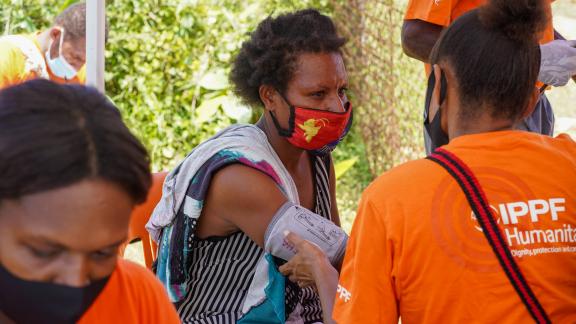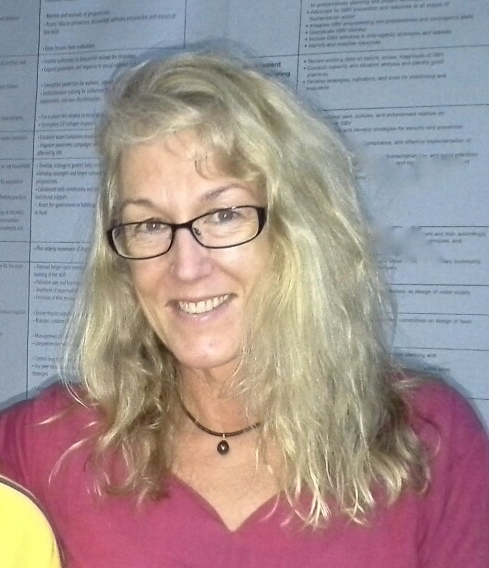Papua New Guinea (PNG), one of the most populated countries in the Pacific, also has one of the highest maternal death rates in the Asia and Pacific regions. The current downward trend of women accessing health facilities or having a skilled birth attendant present during childbirth is alarming. An estimation from 2018 showed that two out of three women in PNG had no access to contraceptives due to geographic, cultural, and economic barriers. These concerning estimates are expected to be further derailed as a result of the COVID-19 pandemic.
The pandemic brought a direct life-threatening impact to PNG’s unprepared health care systems. Many people live with pre-existing vulnerabilities such as lack of access to basic services and healthcare facilities, or who live in natural disaster-prone areas. At the centre of this situation are vulnerable women and girls, especially those with little or no access to sexual and reproductive health and rights (SRHR) services, including contraception - a vital health component that is often deprioritised in crisis settings.
Against this backdrop, the International Planned Parenthood Federation (IPPF) is currently supporting the Papua New Guinea Family Health Association (PNGFHA) to extend essential SRH services from its eight static clinics in hard-to-reach communities via the mobile clinics outreach program.
The main objective of this response is to mitigate the impact of COVID-19 on mortality and morbidity due to adverse SRH conditions. This will include the delivery of crucial Minimal Initial Service Package (MISP) services; the continuation of comprehensive SRH services; the provision of public health information to communities; and COVID-19 infection prevention and control education.
Funded by the Australian government through the SPRINT program, the community outreach mobile clinics are working in 12 districts across four provinces including East New Britain, Eastern Highlands, Morobe, and National Capital District. The National Department of Health is the main coordinator, alongside provincial health authorities, UNFPA, health protection clusters and IPPF Humanitarian for PNGFHA.
Throughout the pandemic, PNGFHA has continued operating its eight static clinics and it has set up an additional 12 mobile clinics since July 2020 with a total of 26 clinical and non-clinical staff.
Access to sexual and reproductive health
Accessibility is the key factor behind this initiative. 85% of the population is estimated to live in rural areas in PNG and have no or minimal form of public transportation to get to public health facilities. With government-imposed stay at home orders, many people are unable or reluctant to travel amid fears of becoming infected at the health facilities.
Women at the Tuna Bay settlement outside of the capital, Port Moresby, have little access to health facilities within their local area. Many women like Vavine Kila fear for their own and their children’s health and wellbeing but are unable to access the healthcare they need due to the high cost of transportation.
“We don’t normally get access to these services in our community,” said Vavine. “When we go out to other locations, sometimes we wait until late, and also it is expensive to travel up and down. It is very vital to bring the services into the community so our people can benefit from it, for the betterment of our children.”
The PNGFHA’s eight mobile clinics across PNG cut down locals’ travelling and healthcare costs. These clinics also extend underserved communities’ access to SRH services including family planning services, contraception, immunisation, and other health treatments.
Local and safe spaces
Local, and primarily female, aid workers are at the core of this response to the COVID-19 pandemic.
Christine Atu is one of the aid workers that joined PNGFHA from the PNG public healthcare system. She is working alongside youth apprentices like midwife Dalyn Maira at the mobile clinics. Their exchange of experience, expertise and insights into the local culture and context ensure the smooth delivery of essential service to the local communities.
when
country
Papua New Guinea
region
East and South East Asia and Oceania
Subject
Humanitarian
Related Member Association
Papua New Guinea Family Health Association

Student midwife Dalyn Maira received practical experience delivering essential SRH services as part of the response
Kalolaine Fanu, IPPFMaira knows youth in her age group, especially those in remote areas, often find it challenging to express themselves when it comes to discussing SRH issues. But the presence of young health workers at the mobile clinic helps young people feel comfortable and supported in seeking appropriate treatment and advice.
“When they open up and tell us about their problems, we discuss the issues and help them to come up with solutions or support,” said Maira. “Then, when they go back to their communities, they share what they’ve learnt, and that’s when we start to get more youths visiting the clinic.”
Saving lives and improving livelihoods
According to the Asian Development Bank, 45 of every 1000 babies in PNG will die before they reach their fifth birthday. To prevent maternal mortality, pregnant women who attend the PNGFHA mobile clinic are assessed, consulted, and provided with antenatal care. PNGFHA aid workers are also reaching out to pregnant women through door-to-door visits. Cases with complications are urgently referred to health facilities and provided with transportation in order to access life-saving Emergency Obstetric and Newborn Care.
With little to no access to credible information on family planning, healthy timing and spacing for pregnancies and healthcare, many women and infants in Papua New Guinea are at increased risk of death and other health issues.
A lack of family planning can also significantly affect women’s livelihoods because they are forced to leave school after starting a family at a young age. Before visiting a PNGFHA mobile clinic, Diana Benson from Ravat Village East New Britain worried about becoming pregnant again and being unable to achieve her dreams. Diana is keen to finish school, attend university and focus on raising her three children. The contraceptive implant she received at a PNGFHA mobile clinic allowed her to plan a better future for herself and her family.
Misinformation
With one of the lowest literacy rates in the Pacific, SRH information in PNG is often misinterpreted and confusing. Local communities are provided with credible information and are able to discuss their concerns with PNGFHA staff at the clinics.
“I am happy to take the implant, but some women [in the community] are afraid of it. Some think they might get cancer if they use it. I tell them to visit the clinic and get the information from the nurses,” said a young woman named Selly from Ngatur Village.
Misinformation on SRH is a big issue in delivering life-saving treatment to women. Therefore, the clinic ensures consultation and discussion takes place with beneficiaries so they can make an informed decision about their treatment plan. In addition to this, highly visual educational materials with minimal words, and easy-to-understand language are distributed to the community.
What is happening in PNG is not an isolated case; the compounded impact of COVID-19 on vulnerable communities all over the world is dire. Humanitarian responses are also facing massive challenges in delivering aid safely to people who need it the most. There is an urgent need for governments, decision-makers, and influencers to acknowledge access to SRH care as a human right, both in stable contexts and in disaster settings.

PNGFHA staff attending to a woman at the mobile clinic in Tuna Bay settlement near Port Moresby
Kalolaine Fanu, IPPFThe country-level impact data for Papua New Guinea shows that the overall efforts in the country have benefitted 19,798 beneficiaries, with 615 unintended pregnancies averted, provided 1,340 couple years of protection and prevented 20 maternal deaths. IPPF will continue to work closely with PNGFHA in its localised response during and post humanitarian crisis. The long-term delivery of sexual and reproductive health services will continue through PNGFHA static clinics across PNG.
Responding to communities during a global pandemic is challenging. The success in PNG is attributed to the lessons learnt, priorities and approaches that have best-served beneficiaries during a pandemic. These successes are based three key points:
1. Ensure continued provision of essential sexual and reproductive healthcare: SRH care must continue despite the challenges of COVID-19 with a tailored approach and continuous peer support and assistance.
2. Protect, promote and advance sexual and reproductive health and rights as responsible advocates: While advocacy initiatives continue with government and policymakers, Member Association staff also continue advocacy with the communities by spreading credible information during consultations and visits.
3. Build resilience among IPPF Member Associations to manage disruptions: The programme adapts and scales up alternative delivery models to reach people most disconnected from healthcare and needing protection in the pandemic. The PNG Family Health Association tailored the outreach with mobile clinics and door-to-door visits, allowing more people with limited resources and who cannot travel due to lockdown restrictions to access lifesaving SRH services.









